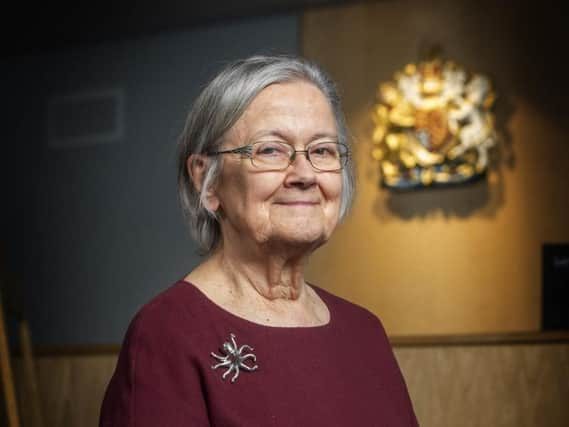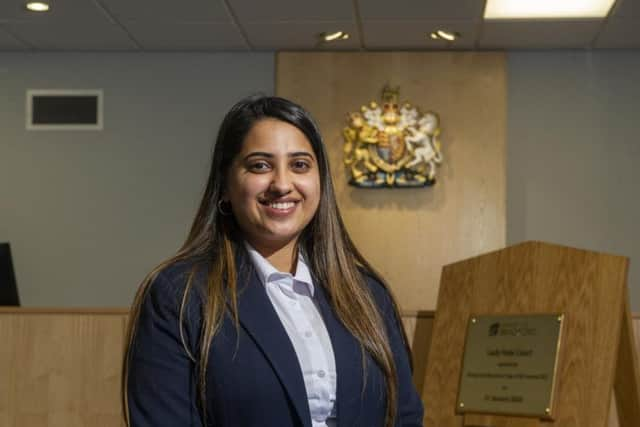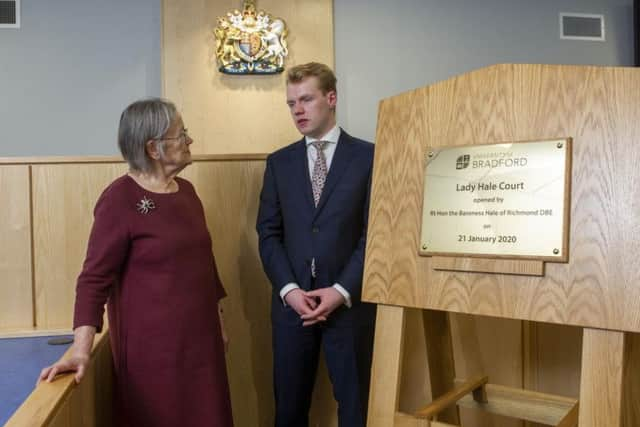Lady Hale hails University of Bradford law school's diversity after unveiling of mock court


The Baroness of Richmond, however, today turned her talents to inspiring Yorkshire youngsters hoping for a career in law.
Wearing an octopus brooch - a now trademark accessory after she caused a stir when delivering the historic judgement that Prime Minister Boris Johnson's prorogation of Parliament was unlawful last year, accompanied by a glistening creepy-crawly pinned to her top - she attended the University of Bradford as a new mock court room was unveiled in her name.
Advertisement
Hide AdAdvertisement
Hide AdAimed at bringing the gravity and drama of the UK's justice system to life for students across various departments, it will also be open to the wider community, says the university, and be a space for potential witnesses to gain an understanding of the daunting courts process.


Speaking to the Yorkshire Post, Lady Hale praised the institution's commitment to widening the access of underrepresented groups to careers in the bar.
She said: "It's very important that the diversity of those entering the legal profession is increased. Because the law is for everyone, and those who are administering the law should reflect everyone. It shouldn't just be a narrow, so-called elite group of people.
"And so a place like Bradford, which is making real efforts towards social inclusion and being there for everyone, is a very valuable place."
Advertisement
Hide AdAdvertisement
Hide Ad-> Who is Lady Hale, the Yorkshire-born Supreme Court President who declared Boris Johnson's suspension of Parliament unlawfulLady Hale, the first woman president of the UK's Supreme Court, added: "One of the most impressive things about the University of Bradford is that it has won an award for social inclusion, it's got a high percentage of BAME [black and minority ethnic] undergraduates and also more than 50 per cent come from the least advantaged areas and this is a great thing.


"It enables people who wouldn't necessarily otherwise think that they were able to come to university, including studying the law, to do so.
"It's absolutely apparent, looking around the room, that it is ethnically very diverse, socially very diverse, and it gives all of those young people the opportunity to make the best of their talents."
She continued: "As I understand it, the proportion of barristers and solicitors is still majority white, majority from independent schools and a high proportion from a small number of universities. This is all getting better, in other words those proportions are decreasing and social inclusion is increasing, but nevertheless there's still quite a long way to go."
Advertisement
Hide AdAdvertisement
Hide Ad-> Spending cuts causing 'serious difficulty' to legal system, says outgoing Supreme Court president Baroness HaleBorn in Leeds to head teacher parents, Lady Hale was educated at Richmond Girls School before studying law at Girton College, Cambridge.
She became the first woman appointed to the Law Commission, which promotes law reform, in 1984.
During her time at the commission, she played a significant role in the Children Act 1989 - legislation which made a child's welfare the "paramount" concern in any decision by a court.
She was the first High Court judge upon her appointment in 1994 to have made her career as an academic, having taught law at Manchester University, rather than as a practising barrister, and became the second woman to sit in the Court of Appeal in 1999.
Advertisement
Hide AdAdvertisement
Hide AdWhen made the first female Law Lord in 2004, she adopted the Latin motto "omnia feminae aequissimae", meaning "women are equal to everything," for her crest.
Third year law students Ifrah Asif and Joseph Corina enjoyed having Lady Hale at the university.
Miss Asif, 20, from East Bowling, said: "Speaking from a woman's perspective it was very inspiring to have her at our campus as walking, talking evidence of 'you can do it just as good as anyone else can'."
The mock court room - which includes a judges bench and spaces for witnesses and legal teams - is aimed at bridging the gap between students' academic learning and practical application in the workplace.
Advertisement
Hide AdAdvertisement
Hide AdLady Hale said: "This is a very realistic mock court room, isn't it?
"It looks very much like a real court and so it will give students the opportunity to try out being an advocate, this means they can work out whether they really want to do it - because there's no point being an advocate unless you really want to do it - but it will also give the opportunity for people to practice being witnesses, because that's an even scarier thing, for many people, than being an advocate.
"And there are plenty of disciplines in which it's quite likely that you might have to be a witness. Here they've got social work, they've got forensic science and people are quite likely to have to be witnesses. So it will give them the opportunity.
"It's also good for law students to practise being witnesses. I always used to think when I was a barrister that it would be a good thing to be a witness, to learn what it would be like, and to work out what didn't work in terms of how you questioned people."
Advertisement
Hide AdAdvertisement
Hide AdShe added: "Obviously there are some people who are regularly witnesses and they do learn and they often have training in how to do it, but for most witnesses it will be the only time in their life they will be a witness, and it is an intimidating experience, there's no doubt. And up to a point, of course, it should be, because they should be anxious to do their best and to tell the truth and make the best of their evidence.
"But of course if they're too nervous, or too intimidated, that's not a good thing. We as judges want people to give their best evidence."